Politics
CHP mayor for Istanbul district detained for corruption
Özgür Kabadayı, the mayor of Istanbul’s Şile district, was among six suspects detained by financial crimes police on Thursday on charges of running a criminal organization, bribery and tender rigging.
He is the latest mayor from the main opposition Republican People’s Party (CHP) to be detained in corruption investigations since last year. Details of the investigation into Kabadayı and other suspects are not clear yet.
Media reports said the investigation included testimonies of eyewitnesses, particularly on bribes to municipal officials. A businessperson told investigators that municipal officials asked for bribes for doing business with the municipality in the district, which is a popular weekend getaway for Istanbulites. The unnamed businessperson said that as a supporter of the CHP, he was disturbed by municipal officials’ actions, adding that he witnessed a colleague paying TL 300,000 ($7,490) to a municipal official for a construction permit. Another businessperson testifying said he paid TL 8 million to municipal officials.
A barrage of investigations focusing on CHP-run municipalities across Türkiye netted mayors and municipal bureaucrats accused of taking bribes in exchange for building permits, rigging tenders and other forms of corruption involving municipal businesses. President Recep Tayyip Erdoğan branded the investigations as efforts to unveil the “tentacles of an octopus of corruption.” The CHP claims the charges are politically motivated, while authorities highlight that the judiciary is independent of any political influence and point out that some investigations were launched upon complaints by CHP members themselves against mayors and municipal officials.
Although several mayors before him were detained or arrested in corruption probes, the arrest of Istanbul Mayor Ekrem Imamoğlu in March for alleged corruption triggered protests by the CHP. CHP Chair Özgür Özel led the protests that occasionally descended into all-out riots. Recently, Özel openly threatened an uprising against the democratically elected government if the corruption investigations continue, prompting outcry from CHP critics who accused him of attempting to instigate a coup.
Imamoğlu, who is declared a future presidential candidate by the CHP after his arrest, faces a spate of accusations alongside corruption charges, including forging his university diploma, and insulting and threatening prosecutors who investigated him.
President Erdoğan says the investigations are needed to address a vast network of corruption and has urged patience. On Wednesday, he said he approved a call by government ally Devlet Bahçeli to amend regulations for the live broadcast of trials of mayors.
Rıza Akpolat, the mayor of the Beşiktaş district of Istanbul for the CHP, was the first mayor to be detained and subsequently arrested in a crackdown on an alleged network of corruption. A businessperson awarded contracts by his municipality and other CHP-run municipalities has testified about the widespread corruption, especially in public tenders, which led to the expansion of the probes. Since then, hundreds of people have been detained on related charges, from businesspeople who confessed to bribes and mayors who took them.
According to the review of legal filings and state disclosures, 14 CHP mayors and more than 200 party members or local officials have been jailed pending trial.
Of those, more than 220 were imprisoned or put under house arrest, according to the review, which was based in part on a compilation of reports by Anadolu Agency (AA).
Since Tuesday last week, the investigation has spread to Izmir, Türkiye’s third-largest city, as well as Antalya, Adana and Adıyaman, leading to the detentions of former and incumbent mayors of those provinces.
Confessions of deputy mayor
Also on Thursday, media outlets published confessions of Mehmet Engin Tüter, the deputy mayor of Antalya’s Manavgat district, who was caught red-handed while accepting bribes in a police sting last Friday. Tüter was caught on video as he was ordered by police officers to open a box of baklava handed to him minutes before by a businessperson. The footage showed that the box contained a stash of euros. Other footage showed him discreetly accepting the box, fully aware of the cash hidden inside.
After his detention, Tüter invoked the “effective repentance” law that grants lenient sentences for suspects in exchange for confessions and detailed how other municipal officials were involved in bribes. Tüter is the deputy working under Mayor Niyazi Nefi Kara, who was earlier detained on corruption charges.
He told investigators that Kara set up a team of associates comprised of his friends and next of kin after he took office, after winning the 2024 municipal elections. He said Kara’s nephew and a friend were assigned as key bureaucrats in the municipality. “(Kara’s nephew) Hüseyin Cem Gül was very active at the municipality. Although he had no official post at the municipality, the mayor had instructed bureaucrats to consult with him, particularly while issuing building licenses and permits, especially for hotels,” the deputy mayor of a popular tourist destination told investigators.
“No one was able to secure a license without asking Gül first,” he said.
Tüter said the municipality allowed a hotel to run several shops without proper licenses, apparently in exchange for bribes, and issued licenses for two other hotels though they did not comply with building regulations, claiming that Gül “benefited” from permits.
He said the mayor asked an assembly member to recruit a wrestler for the municipality’s sports club, in exchange for allowing the said member to build more rooms for her hotels, though it was against regulations. Tüter stated that the said wrestler was also paid TL 4 million by the assembly member who was in charge of the sports club.
Tüter said that in one case, a hotel owner was asked to “furnish” the office of the mayor in exchange for a permit.
Politics
AK Party to define road map based on Türkiye’s current trajectory
The ruling Justice and Development Party (AK Party) is set to hold its 32nd consultation and evaluation meeting beginning Saturday in Ankara, where top party officials, lawmakers and leaders will gather to assess Türkiye’s current trajectory and define the party’s road map for the upcoming term.
AK Party Secretary-General Eyyüp Kadir Inan and Deputy Chairperson Faruk Acar held a press conference Friday at the hotel where the camp will be held, emphasizing the strategic importance of the annual meeting. Inan noted that the three-day event will open with a keynote address by President Recep Tayyip Erdoğan.
Inan said the camp will not only shape the party’s new-term road map but also signal its strategic vision to both Türkiye and the international community.
Deputy Chair Faruk Acar revealed that the camp has been organized with a fresh approach this year, including a carefully chosen theme designed to reflect the party’s current vision and Erdoğan’s leadership.
“The environment here reflects the spirit of the AK Party and our president’s leadership,” said Acar. “Even the slogans on the pillars around you are not random, they echo the AK Party’s legacy. This year, we’ve embraced a new theme: ‘Leadership that transcends borders with the power of the nation.’ It symbolizes how Erdoğan’s leadership is now recognized across the globe.”
Acar also announced that the party is preparing a documentary to mark the AK Party’s 24th anniversary next month, adding that they are focused on carrying the movement’s traditions into the future while incorporating the vision of modern Türkiye.
Erdoğan address
When asked about the content of Erdoğan’s anticipated speech, Acar noted that it will offer a comprehensive overview of the government’s efforts toward achieving a terror-free Türkiye.
“For several days, our party spokesperson has shared developments about the disarmament process related to terrorism. Tomorrow, Erdoğan will deliver a historic evaluation of this process, outlining what’s been accomplished and what steps lie ahead,” Acar said.
He emphasized that the president’s address will also include perspectives on national unity, security and regional leadership, reinforcing Türkiye’s broader strategy in combating terrorism.
As part of the weekend’s agenda, the AK Party aims to promote greater synergy among members, reinforce the tradition of consultation, and set the tone for future policy directions. Acar said continuous updates will be shared throughout the event to inform the public and the party’s base.
“We are building a foundation where collective wisdom and shared vision will shape the future,” Acar concluded.
Politics
Erdoğan’s chief advisor Yiğit Bulut dies after long battle with cancer
Yiğit Bulut, chief advisor to President Recep Tayyip Erdoğan and a member of Türkiye’s Economic Policies Board, died after a long battle with cancer on Friday.
Bulut, 53, who was receiving treatment at a private hospital in Istanbul, passed away this morning, according to a statement from former Interior Minister Süleyman Soylu.
Now an Istanbul representative for the Justice and Development Party (AK Party), Soylu announced the news of Bulut’s death on X.
“Our Chief Advisor to the President, Member of the Economic Policies Board, journalist, author, and economist, my dear friend Yiğit Bulut, passed away this morning after a painful illness. I offer my condolences to his grieving family, relatives, and loved ones. May God have mercy on him and grant him rest in peace,” Soylu said.
AK Party spokesperson Ömer Çelik also confirmed the news, offering his condolences.
Separately, Erdoğan issued a message on X.
“I learned with deep sorrow that one of our Chief Advisors to the President, a member of the Economic Policy Board, and my valued colleague, Yiğit Bulut, passed away. I offer my condolences to Yiğit’s family, relatives, and all colleagues, and may God have mercy on him,” Erdoğan said.
Bulut had served as chief advisor to Erdoğan since August 2014.
He is survived by his spouse, Burcu Bulut.
Politics
PKK disarmament pushes terror-free Türkiye past critical threshold: Çelik
After dozens of PKK terrorists destroyed their weapons in northern Iraq, the terror-free Türkiye goal has passed a critical threshold, ruling Justice and Development Party (AK Party) spokesperson Ömer Çelik said Friday.
In a statement on X, Çelik stressed that the disbandment and disarmament process must be completed “as soon as possible.”
Çelik emphasized that this marks the first concrete step toward dismantling the PKK in line with Turkey’s strategic objective.
“With Mr. Devlet Bahçeli’s historic call and the state’s will manifested by President Recep Tayyip Erdoğan, the determination to turn a historic page in Türkiye’s liberation from the burden of terrorism is progressing stronger,” he stated.
Highlighting cross-party cooperation, Çelik said the frequent consultations between political parties, particularly with the PKK-affiliated Peoples’ Equality and Democracy Party (DEM Party), reflect the growing sensitivity and consensus needed to support the disarmament process.
“Parliament’s will and the contributions of all political parties will have a tangible impact,” he added.
Çelik also assured that state institutions are engaged in coordinated efforts across diplomacy, intelligence and security to ensure the success of the initiative.
He praised the sacrifices of Türkiye’s martyrs and veterans, saying their efforts have preserved national unity and sovereignty under the principle of “one homeland, one nation, one state, one flag.”
“A critical threshold has been crossed,” he said, while warning against provocations that could undermine the process. He stressed that Türkiye remains vigilant against attempts to exploit terrorism for proxy wars or imperialist designs in the region.
“The goal of a ‘terror-free Türkiye’ is not only essential for our nation, but it also inspires the establishment of a broader ‘terror-free zone’ in our immediate region,” Çelik concluded
Politics
Türkiye, ASEAN need stronger ties against global challenges: FM Fidan
Foreign Minister Hakan Fidan on Friday urged stronger collaboration with the Association of Southeast Asian Nations (ASEAN), highlighting common challenges and mutual strategic interests between Türkiye and the Asia-Pacific region.
“Türkiye stands ready to support ASEAN’s 2045 vision for a resilient, inclusive and sustainable community,” he said.
The Turkish foreign minister also reaffirmed his country’s commitment to strengthening ties under all three pillars of the ASEAN community and called for support to elevate Türkiye’s status to a full dialogue partner.
Speaking at the 7th Türkiye-ASEAN Trilateral Meeting on Sectoral Dialogue Partnership in Kuala Lumpur, Fidan said the gathering offered a “timely opportunity” to assess the current state of relations and reflect on common goals.
“The Asia-Pacific region stands at a critical crossroads,” he said, pointing to ongoing geopolitical tensions, economic volatility and environmental disruptions. “Security perceptions have changed as a result of great power competition.”
Fidan noted that countries in the region are adjusting national security strategies, increasing defense spending and placing greater emphasis on economic security. He argued that Türkiye faces similar dynamics in its neighborhood and that current global governance mechanisms are failing to address overlapping crises, with Gaza being a prime example.
“These crises speak to a deeper truth: Our governance mechanisms are fragmented, reactive and often hostage to geopolitical deadlock,” he said. “This is the moment to act collectively and build bridges based on regional ownership.”
Fidan underscored the importance of cooperation with ASEAN, describing both Türkiye and ASEAN as strategically located and economically significant actors in their respective regions.
“ASEAN ranks among the world’s top five largest economies and is a model of regional integration,” he said. “Türkiye is the 17th largest economy globally and one of the fastest-growing among OECD countries.”
Bilateral trade between Türkiye and ASEAN surpassed $15.7 billion last year, according to Fidan, highlighting what he called the “scale of existing potential.”
Türkiye established institutional relations and signed the Treaty of Amity and Cooperation, one of ASEAN’s founding documents, in 2010, before becoming a sectoral dialogue partner in 2017.
Fidan also held bilateral meetings with his counterparts from Malaysia, Brunei, Singapore, Papua New Guinea and Laos on the sidelines of the meeting.
The Turkish Foreign Ministry shared an update on the social media platform X, detailing Fidan’s diplomatic engagements during his visit to the Malaysian capital.
Fidan separately met Malaysian Foreign Minister Mohamad bin Hasan, Brunei’s Second Foreign Minister Dato Erywan Yusof, Laos’ Foreign Minister Thongsavanh Phomvihane, Singaporean Foreign Minister Vivian Balakrishnan and Papua New Guinea’s Foreign Minister Justin Tkatchenko.
Fidan also held a meeting with Australian Foreign Minister Penny Wong.
Politics
Syrian govt looks for momentum for integration of US-backed YPG
Syria’s new administration is looking for a centralized future, while the U.S.-backed terrorist group YPG, the Syrian wing of the PKK, still insists on autonomy in the northeast. Damascus reiterated its rejection of federalism on Wednesday following a meeting with YPG leader Ferhat Abdi Şahin, code-named Mazloum Kobani, calling on the YPG to join the ranks of government forces.
Şahin and interim President Ahmed al-Sharaa first struck an accord for integration in March with U.S. backing, but its implementation has been held up by differences between the two sides. Şahin met with Syria’s leader in Damascus on Wednesday in the presence of a U.S. envoy to discuss stalled efforts to integrate the YPG into the Syrian state.
The YPG, which controls vast swathes of territory in Syria’s north, including oil and gas fields, has demanded a decentralized system of governance, which the new authorities in Damascus have rejected.
A Syrian government source told the official Al-Ekhbaria television channel on Wednesday that Damascus remained committed to “the principle of ‘One Syria, One Army, One Government,’ and categorically rejects any form of division or federalization.”
“The Syrian army is the national institution that unites all children of the homeland, and the state welcomes the integration of Syrian fighters from the SDF into its ranks within the approved constitutional and legal frameworks,” the source said, referring to the umbrella body Syrian Democratic Forces (SDF) dominated by YPG terrorists. The source also warned that any delays in implementing integration risked hindering efforts to “restore security and stability to all regions.”
In an interview with the TV channel Kurdistan 24, U.S. Ambassador to Türkiye and special envoy to Syria Tom Barrack said that while he recognized the SDF’s role in the fight against Daesh, it had to accept the “reality” that “the only future path for them is Damascus.”
Al-Sharaa had previously called for the dissolution of all armed groups in Syria.
Meanwhile, in an interview in May, Şahin emphasized the need for a “decentralized Syria where all its components live with their full rights,” an outcome he accused Syria’s new authorities of opposing.
The same month, Syrian Foreign Minister Asaad al-Shaibani warned that delaying the integration of the self-styled autonomous administration could “open the door to foreign interference, and fuel separatist tendencies.”
Barrack, told The Associated Press (AP) after the meetings in Damascus that there are still significant differences between the sides.
Barrack’s meetings came after a move by the Trump administration took effect this week, revoking a terrorism designation of the former insurgent group led by al-Sharaa, which was behind a lightning offensive last December that ousted Syria’s longtime autocrat Bashar Assad. Revoking the designation was part of a broader U.S. engagement with al-Sharaa’s new, transitional government.
Under the March deal, the SDF forces would merge with the new Syrian national army. The agreement, which is supposed to be implemented by the end of the year, would also bring all border crossings with Iraq and Türkiye, airports and oil fields in the northeast under the central government’s control. Detention centers housing thousands of Daesh members, now guarded by the YPG, would also come under government control.
However, the agreement left the details vague, and progress on implementation has been slow. A major sticking point has been whether the YPG would remain as a cohesive unit in the new army or whether the force would be dissolved and its members individually absorbed into the new military.
Barrack said that it is still “a big issue” between the two sides. “I don’t think there’s a breakthrough,” Barrack said after Wednesday’s meetings. “I think these things happen in baby steps, because it’s built on trust, commitment and understanding.”
He added that, “For the two parties that have been apart for a while and maybe had an adversarial relationship for a while, they have to build that trust step by step.”
Barrack said that though “we’re not there” yet, Damascus had “done a great job” in presenting options for the YPG to consider. “I hope they will and I hope they’ll do it quickly,” he said.
A key turning point for Syria came when U.S. President Donald Trump met with al-Sharaa in Saudi Arabia in May and announced that Washington would lift decades of sanctions, imposed over Assad’s government. The U.S. played a key role in brokering the deal announced in March between al-Sharaa’s government and the YPG and urged it to integrate with Damascus.
Barrack said Washington has “complete confidence in the Syrian government and the new Syrian government’s military,” while the YPG has been a “valuable partner” in the fight against Daesh and that the U.S. “wants to make sure that they have an opportunity … to integrate into the new government in a respectful way.” The U.S. has begun scaling down the number of troops it has stationed in Syria. There are about 1,300 U.S. forces now, but Barrack said Washington is in “no hurry” to pull out completely.
In the interview with the AP, Barrack also downplayed reports of possible breakthroughs in talks on normalizing ties between Syria and Israel.
“My feeling of what’s happening in the neighborhood is that it should happen, and it’ll happen like unwrapping an onion, slowly … as the region builds trust with each other,” he said without elaborating.
Since Assad’s fall, Israel has seized a U.N.-patrolled buffer zone in Syria bordering the Israeli-annexed Golan Heights and has launched hundreds of airstrikes on military sites in Syria. Israeli soldiers have also raided Syrian towns outside the border zone and detained people whom they said were militants, sometimes clashing with locals.
Politics
Türkiye’s new climate law prioritizes welfare, agriculture: Directorate
Türkiye’s newly enacted climate law places a strong emphasis on protecting social welfare while prioritizing key sectors like agriculture and animal husbandry, according to Halil Hasar, director of the Climate Change Directorate at the Environment, Urbanization and Climate Change Ministry.
Speaking to Anadolu Agency (AA), Hasar described the law as a strategic, domestically tailored step that balances environmental responsibility with economic priorities.
“The climate law was planned entirely considering Türkiye’s historical responsibilities and current situation,” he said. “It does not restrict the freedom of any individual, does not worsen social welfare, and prioritizes agriculture, animal husbandry, water resources and climate justice.”
The law, passed by the Turkish Parliament on July 2, will be coordinated by the Climate Change Directorate, but its implementation will involve all relevant public institutions and organizations.
Hasar echoed President Recep Tayyip Erdoğan’s recent remarks, calling it “a completely domestic and national law.”
He said that criticism of the law largely stems from its name rather than its actual content.
“There are no articles penalizing or restricting individuals. The regulations are preventive and guiding, especially for industry,” Hasar said.
Addressing concerns from the industrial sector, Hasar emphasized that the law introduces protective obligations rather than punitive measures. He pointed out the importance of aligning with global economic trends, particularly the rise of border carbon regulation mechanisms.
“If you don’t take precautions, one day you may not be able to export a good you produce here,” he warned.
Türkiye, as a nation committed to international trade and economic growth, must prepare for the evolving global climate policies, Hasar concluded.
The new law aims to ensure the country stays competitive while advancing environmental sustainability and social equity.
-
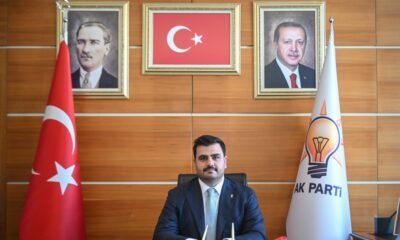
 Politics3 days ago
Politics3 days agoTürkiye’s ruling AK Party to chart the future in strategic workshop
-
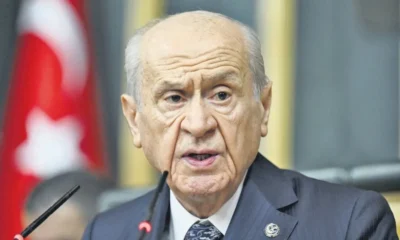
 Daily Agenda3 days ago
Daily Agenda3 days agoHard warning from Bahçeli to Özel: No, are you thinking of a coup? Let’s see the streets and see
-
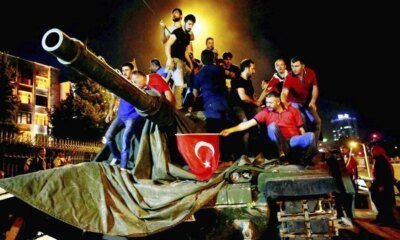
 Daily Agenda3 days ago
Daily Agenda3 days agoIf we forget, our blood is dry – last minute news
-
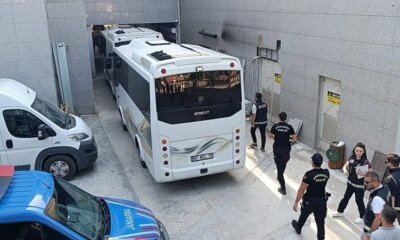
 Daily Agenda3 days ago
Daily Agenda3 days agoBAKLAVA arrested bribes in the box
-

 Sports2 days ago
Sports2 days agoSüper Lig transfer frenzy heats up with Kökçü, Osimhen, Rashford
-

 Refugees3 days ago
Refugees3 days agoTurkey bans Musk’s AI chatbot Grok for offensive content
-
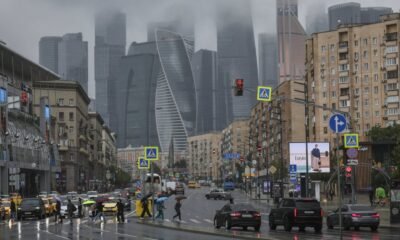
 Economy2 days ago
Economy2 days agoRussia reportedly confiscated $50 billion in assets over 3 years
-

 Politics3 days ago
Politics3 days agoPKK disarmament ‘only a matter of time’: Turkish govt ally




